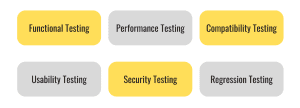content
Quality Assurance
October 5, 2023
6 min read
Introduction
Ensuring the delivery of high-quality products has become paramount. Among the array of testing methodologies, one stands out for its effectiveness in identifying and resolving issues: QA testing, or Quality Assurance testing. In this article, we’ll provide an overview of what QA testing is, why it’s essential for delivering high-quality software products, and delve into various testing types and methodologies.
What is QA Testing?
Quality Assurance (Q&A or QA) testing is a systematic process of evaluating software to ensure it meets predefined quality standards and performs as expected. It involves a comprehensive examination of the software’s functionality, usability, security, and overall user experience. The primary objective of Q&A testing is to identify defects, bugs, or inconsistencies within the software and rectify them before the product is released to end-users.
Why is QA Testing Essential?
- Enhanced User Experience: Software that undergoes rigorous Q&A testing is more likely to offer a smooth, error-free user experience. This, in turn, leads to higher customer satisfaction and retention rates.
- Cost Savings: Identifying and fixing issues early in the development process is considerably less expensive than addressing them after a product’s release. QA testing helps in reducing post-release maintenance costs.
- Reduced Business Risks: High-quality software is less prone to security vulnerabilities and data breaches, protecting the organisation’s reputation and reducing legal and financial risks.
- Competitive Advantage: In a crowded market, quality sets you apart. Software that consistently performs well gains a competitive edge and attracts more users.
Types of QA Testing

- Functional Testing: This type of testing evaluates whether the software functions according to its specifications. It includes unit testing, integration testing, system testing, and regression testing.
- Usability Testing: Focuses on the software’s user-friendliness, ensuring that it is easy to navigate and meets user expectations.
- Performance Testing: This involves testing the software’s performance under different conditions, such as load testing (evaluating performance under heavy traffic), stress testing (checking system behaviour under extreme conditions), and scalability testing (assessing the software’s ability to handle increased workloads).
- Security Testing: Security is paramount in today’s digital landscape. Security testing identifies vulnerabilities and weaknesses in the software that could be exploited by malicious actors.
- Compatibility Testing: Ensures that the software functions seamlessly on various platforms, browsers, and devices.
- Regression Testing: Verifies that recent code changes have not adversely affected previously working features.
Testing Methodologies:
- Waterfall: In this traditional approach, testing is typically carried out at the end of the development cycle. It’s well-suited for projects with stable requirements and a clear scope.
- Agile: Agile methodologies incorporate testing throughout the development process, allowing for continuous feedback and adaptation. This is ideal for projects with evolving requirements.
- DevOps: Integrates development and operations, promoting collaboration between teams. Continuous testing is crucial in a DevOps environment to ensure seamless integration and deployment.
- Shift-Left Testing: This approach emphasises early testing, bringing testing into the development phase, and helps identify issues sooner in the process.
Conclusion
Quality Assurance testing is a critical element of the software development lifecycle. It ensures that software meets the highest standards of functionality, security, and usability, contributing to enhanced user satisfaction, reduced costs, and competitive advantage. By understanding the various testing types and methodologies, organisations can make informed decisions about when and how to implement QA testing in their software development process, ultimately delivering products that stand out in the market. In the digital age, where software quality is non-negotiable, QA testing is the key to success.
If you have any questions or an idea for a project, contact us via sales@instandart.com or fill out the form on the main page of the site to discuss. We are always ready to help!
